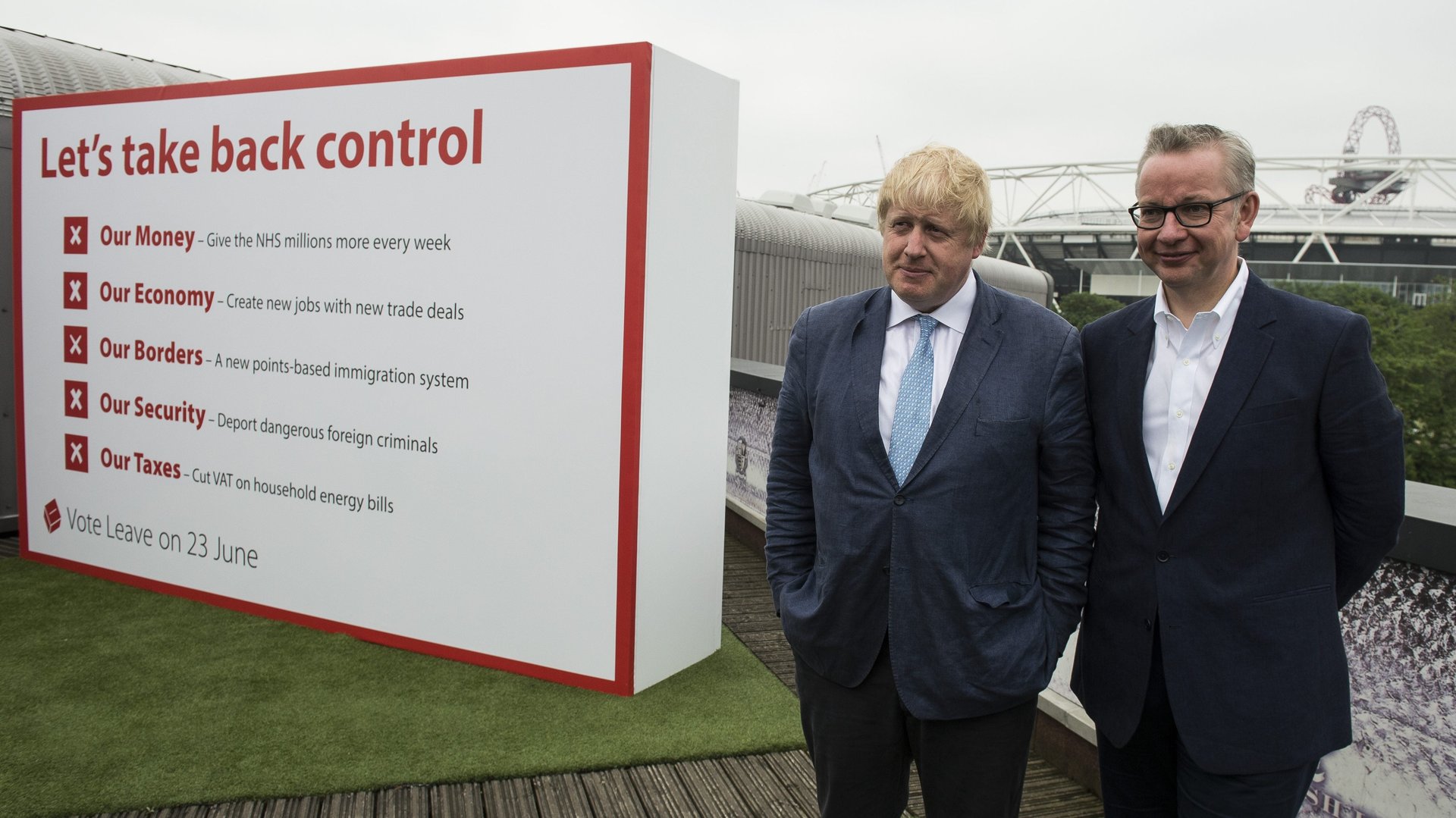Everything you need to know about the investigations into the Brexit campaign
On Nov. 21, Britain’s Electoral Commission opened its fourth current investigation into the activities of those who successfully campaigned for Britain to leave the European Union in a 2016 referendum.


On Nov. 21, Britain’s Electoral Commission opened its fourth current investigation into the activities of those who successfully campaigned for Britain to leave the European Union in a 2016 referendum.
They include questions over Russian “dark money,” data services provided by a firm whose billionaire owner is a major Donald Trump backer, and £625,000 ($826,950) in donations to a 23-year-old fashion student. Here’s everything you need to know.
Arron Banks and “Dark Money”
A crucial figure here is Arron Banks, an insurance magnate, self-styled “bad boy,” and right-wing donor. Banks claims (paywall) to have ploughed almost £9 million into the Brexit campaign and was the main backer of Leave.EU, the number two campaign group on the Leave side.
It’s not entirely clear, however, whether all that money was actually his—the Electoral Commission is investigating the origin of £2.3 million worth of donations made in his name. Labour MP Ben Bradshaw has raised questions over Banks’s ties to “dark money” and Russian involvement in the Brexit campaign. An investigation by the Open Democracy website alleges that Banks has exaggerated his wealth and asked where he got the money for his donations.
Banks, who has declared his admiration for Russian president Vladimir Putin and held a lengthy lunch with Russia’s UK ambassador, says allegations that Russians gave him political funding are “complete bollocks.” “My sole involvement with the ‘Russians’ was a boozy six-hour lunch with the ambassador where we drank the place dry (they have some cracking vodka and brandy),” he said, while calling for investigations to be lead by a judge rather than the Electoral Commission.
Leave.EU and Cambridge Analytica
A second investigation is looking into whether Leave.EU illegally used the services of Cambridge Analytica, a data analytics firm largely owned by American billionaire Robert Mercer, who backed US president Trump, and until recently owned a stake in far-right news organization Breitbart. British elections have a hard spending limit, and there are questions over whether Leave.EU broke campaign laws by allegedly using Cambridge Analytica’s services as a gift, failing to count the market value of those services to its total spending allowance.
Cambridge Analytica’s involvement with Leave.EU is unclear. In February 2016, its CEO wrote that the firm “already helped supercharge Leave.EU’s social media campaign by ensuring the right messages are getting to the right voters online,” the Observer reports. Leave.EU communications chief Andy Wigmore said they hadn’t employed Cambridge Analytica but that the firm was “happy to help,” seemingly implying they had been involved.
The firm uses data to create detailed profiles of individuals and then predicts how they will vote. Campaigns can then use that data to work out who and how to target.
The fashion student and the Canadian data firm
23-year-old fashion student Darren Grimes ran BeLeave, an independent campaign for young people in favor of Brexit. He was legally allowed to spend £700,000. The official leave campaign group, Vote Leave, had a spending limit of £7 million but was allowed to donate money to other campaigns. It gave Grimes £625,000 towards the end of the campaign, which he sent straight to AggregateIQ, a Canadian data analytics firm on which Vote Leave spent around 40% of its budget.
The big question is whether Vote Leave told Grimes to do that. While it’s allowed to give money away, campaign rules ban it from telling recipients how to spend it—his campaign had to be completely independent from Vote Leave. Both Grimes and Vote Leave deny that there was any coordination between them.
The Electoral Commission looked into the matter in February and March 2017, concluding that it didn’t need to take any further action. It reopened the case on Nov. 21, announcing that new information “has given the Commission reasonable grounds to suspect an offense may have been committed.”
The investigation is also looking into a £100,000 donation that Vote Leave gave to Veterans for Britain, another campaign group which also paid its money straight to AggregateIQ. Veterans for Britain also denies having coordinated with Vote Leave.
ALL the campaigns
Since February, the Electoral Commission has been investigating various discrepancies in campaign receipts from both the Remain and Leave sides. They say various campaigns haven’t submitted enough invoices and receipts to support their returns, alongside other issues like late submissions.
Outside the investigations
Not under investigation is Russia’s alleged use of 150,000 Twitter bots to push for Brexit. Another network of 13,000 bots, which doesn’t seem to be connected to Russia, was reportedly used to retweet largely pro-leave messages.
What could the upshot be?
Remainers shouldn’t start dreaming about another referendum—the Electoral Commission’s punishments are more about political symbolism than undoing results. The Electoral Commission can issue a maximum £20,000 fine per offence and can refer cases with possible criminal implications to the police. A heavy indictment might boost voices at Westminster calling for a new vote, but that’s out of the Commission’s hands.